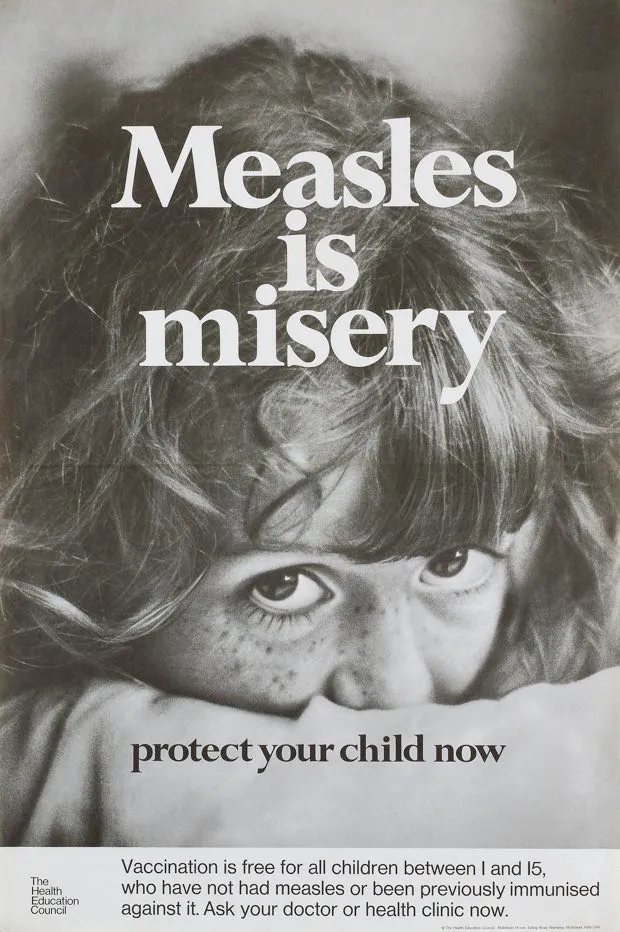Update 20/08/19: Due to an increase in measles cases in 2018, the UK has lost its WHO measles elimination status. This means that the virus is circulating around the UK again, most likely due to fewer children receiving the second dose of the MMR vaccine.
In 2017, the UK successfully eliminated measles for the first time: the number of cases was so low that the disease could no longer spread throughout the general population.
Although it might sound like the war against measles has been won, the disease is only kept bay through continual vaccination, since the virus isn’t yet completely eradicated. To this end, the World Health Organization recommends that at least 95 per cent of all children receive two doses of the vaccine by the age of five. According to the Centers for Disease Control and Prevention in the USA, a single dose of the MMR vaccine is 93 per cent effective at preventing measles, whereas a second dose brings this up to 97 per cent.
There were over three times as many confirmed cases of measles in England in 2018 than in 2017, and the number of two-year-olds who had received the first dose and five-year-olds who had received the second dose both dropped for the fourth year in a row. Dr Seth Berkley, CEO of Gavi, the Vaccine Alliance, an international organisation investing in vaccination, blamed Europe’s general decrease in vaccination on “complacency about the disease and the spread of falsehoods about the vaccine.” For instance, we found that researching the laws regarding vaccinations brings up a series of websites advocating anti-vaccination ideology.
Professor Matt Keeling, who studies epidemiology at the University of Warwick, explains that the recommended 95 per cent level is to achieve ‘herd immunity’. “Measles is highly transmissible. Before vaccination, each infected child was estimated to spread infection to 15 to 20 others on average. If we vaccinate 95 per cent of the population, then 19 out of these 20 secondary cases are protected, and the disease will die out and cannot re-invade.”
Visit the BBC's Reality Check website at bit.ly/reality_check_ or follow them on Twitter@BBCRealityCheck
Limiting the disease’s spread means that the herd (in this case people who are immune to measles) protects people who can’t be vaccinated, such as children who are too young or have medical complications, or people who have a severely compromised immune system that can cause them to lose their vaccine immunity.
“In general, the fewer individuals vaccinated, the more cases we are likely to see in the future. Given the severe effects of measles – brain damage or even death – we need to do all we can to reduce cases. It’s estimated that measles is fatal in 1 in 25,000 cases, and can cause serious problems to the unborn child if a mother gets infected during pregnancy,” explains Keeling. “The other issue is that if the vaccination level is low and we don’t see many cases of measles, then we are storing-up lots of susceptible individuals, which could give rise to large-scale epidemics.”

In 2018, approximately 88 per cent of children in the UK had received two doses of the MMR vaccine by the age of five, a figure which has dropped by about half a per cent per year for the past four years.
“While a 0.5 per cent change sounds small, the issue is that we are not vaccinating enough children to prevent future outbreaks,” says Keeling. “With just 88 per cent vaccination, we are building up pools of susceptible children, who may be aggregated in certain schools or areas. This means that we would expect to start seeing localised outbreaks, like the epidemic that was seen in Swansea in 2013, where there were several complications and one death.”
The outbreak came 10 years after widespread, unfounded fears about the vaccine’s safety had led to MMR uptake dropping to only 67.5 per cent among two-year-olds in Swansea. The result a decade later was a large group of susceptible 10- to 18-year-olds, who were the main contributors to the 1,200 confirmed cases.
“I am deeply concerned that when the vaccine has been proved by multiple independent groups to be safe, there are still families that refuse to protect their children, and therefore also endanger others who may not be fully protected,” says Keeling.
- The MMR vaccine is available on the NHS at any age.
Follow Science Focus onTwitter,Facebook, Instagramand Flipboard
